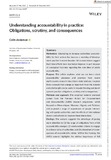| dc.contributor.author | Anderson, Colin | |
| dc.date.accessioned | 2023-03-14T09:25:00Z | |
| dc.date.available | 2023-03-14T09:25:00Z | |
| dc.date.issued | 2022-12-30 | |
| dc.identifier.citation | Anderson, C. (2023) Understanding Accountability in Practice: Obligations, Scrutiny, and Consequences, Development Policy Review, 00, e12687m, DOI: 10.1111/dpr.12687 | en |
| dc.identifier.uri | https://opendocs.ids.ac.uk/opendocs/handle/20.500.12413/17901 | |
| dc.description.abstract | Attempting to increase authorities' accountability for their actions has become a mainstay of development practice in recent decades. Yet commentators suggest that these efforts have reached an impasse, in part because of conceptual fuzziness regarding the core ideas of public accountability.
This article explores what we can learn about accountability processes and practices from recent multi-country research into citizen–state relations. I explore three concepts that emerge as important from this material and which might also be useful in broader thinking and development practice: obligations, scrutiny, and consequences.
The empirical material analysed comes from the five-year Action for Empowerment and Accountability (A4EA) research programme, which focused on Mozambique, Myanmar, Nigeria, and Pakistan, and explored a range of experiences of people interacting with public authorities, and the efforts of international donors and activists to improve these interactions.
The analysis suggests the advantage of paying more attention to (1) the range of obligations from which accountability emerges; (2) what enables citizens to engage in active scrutiny of authorities; and (3) a broad set of consequences of accountability claims. Within this framing, the A4EA material highlights the relative importance of felt obligations and the social contract over formalized entitlements, development of capacities and spaces for informed citizens to actively question authorities, and of outcomes where authorities accept responsibility for their actions or the status quo as well as experience direct sanctions.
Efforts for greater public accountability might be sharpened by identifying what would represent effective scrutiny against felt accountability obligations, and what spaces, capacities, and opportunities are required for that. Incorporating a better understanding of the consequences that come about from accountability claims could help create better measures and understandings of success, and what generates it. | en |
| dc.language.iso | en | en |
| dc.publisher | John Wiley & Sons, Ltd | en |
| dc.rights.uri | http://creativecommons.org/licenses/by/4.0/ | en |
| dc.subject | Governance | en |
| dc.subject | Politics and Power | en |
| dc.subject | Security and Conflict | en |
| dc.title | Understanding Accountability in Practice: Obligations, Scrutiny, and Consequences | en |
| dc.type | Article | en |
| dc.rights.holder | © 2023 The Author. Development Policy Review published by John Wiley & Sons Ltd on behalf of ODI | en |
| dc.identifier.externaluri | https://onlinelibrary.wiley.com/doi/epdf/10.1111/dpr.12687 | en |
| dc.identifier.team | Power and Popular Politics | en |
| dc.identifier.doi | 10.1111/dpr.12687 | |
| dcterms.dateAccepted | 2022-12-30 | |
| rioxxterms.funder | Department for International Development, UK Government | en |
| rioxxterms.identifier.project | PO7239 Action for Empowerment and Accountability Programme | en |
| rioxxterms.version | VoR | en |
| rioxxterms.versionofrecord | 10.1111/dpr.12687 | en |
| rioxxterms.funder.project | 5cecb4e4-a784-4ff9-b559-66fc23b1b999 | en |


